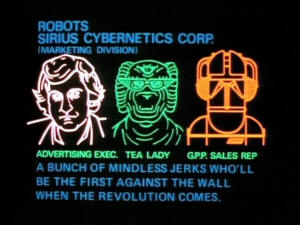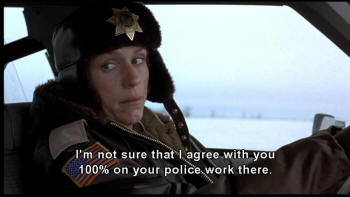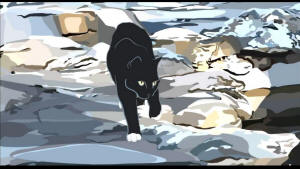|
Site Map 9/11 MYSTERIES: DEMOLITIONS |
||||||||
|
Eric: Well, now that you know about all of this, about 9/11 and the deception, when you watch TV, what is the message you're picking up? What do you see them doing? Do you see a message coming out. Sofia: Yes. They're whipping our emotions around. I had to turn a channel just now when I was going to watch a wonderful DVD on vaccines, and I logged in, as I'm used to saying for the computer, and there was some fat guy on some news station telling us, "What the Democrats are trying to get us to believe ..." and it was so confusing, it made my brain hurt. So I had to turn it off. Eric: That was regular television, right? Sofia: Yes. No, no. I think it was a cable channel. I don't know what it was. I didn't want to find out. It was a painful experience, even though it was very brief. It makes your head hurt, and they want you to take sides, and they are jerking you around. If that's what you want in your life, then that's great, but unfortunately, somebody told me that human beings are more easily trained than the dog, okay? Just think about it. If you're training a dog to sit, you have to press on its back end and you have to say, "sit, sit, sit," and press really hard on his hindquarters. And eventually he will let his legs give way because he realizes you really want him to do this, and you'd really like it if he did that, and then he gets a treat. And human beings, we have language at our disposal. So all you have to do is tell a person, "Those buildings fell down because the steel was weak," and they go, "Oh, okay." Eric: And then reward them with something, like now you're with the crowd, you're not one of those conspiracy nuts, and ... Sofia: That we're all human and we make mistakes, and those engineers who made those buildings, they made a terrible mistake! And as I say in the building, they built the building to take the impact of a jet plane, but they forgot to take into account the fuel.
Eric: One of the things that I've noticed is when you look at who can deal with 9/11 and who can't, it has nothing to do with intelligence. It's more the personality. And it may be the ones who are not so easily swayed, who are more independent. That's what it seems to me. Are you finding, or haven't you thought much about who ... Sofia: Of course I've thought about who likes this and who doesn't. Eric: Have you noticed any patterns, and who can deal with it? Sofia: Well, I find that people with children are the most resistant to accepting that something really bad is going on. And it was ongoing, it wasn't isolated. It's not like it happened on 9/11. So I think people with small children are the most resistant. People with grown children, they are often trying to convert their children since children will go the opposite direction of their parents. If the parents are aware of 9/11, chances are good that the grown kids don't want to believe it. Eric: Is that what you're finding? Sofia: Yes, yes. I am. And then people without children have an easier time because they don't have to deal with the pain and fear that they brought other beings into this world.
But I think it's best accomplished by invitation, that we invite people to consider this. And later, after they've given it some thought, to agree it had to have happened through laws of science and not myth. And that creates unity. Unity is best created by invitation, not by confrontation and accusation or ridicule.
Eric: And what sort of reaction have you been getting from the people who have been buying more than one of these copies to distribute? Are they seeing more of a change now? Because it was really tough in 2002, 2003 -- I suppose you weren't involved at all then -- have you been getting much of a reaction? Because you said some people up in Seattle, some teenage girls were even singing along with the music. Sofia: I don't think it was teenagers there. These were adults, full-grown adults. Yes, there's a 9/11 group in Seattle. The group has been actively showing 9/11 Mysteries, and a friend of mine was invited to attend one of their screenings, and say a few words because she knows me. And she was a little aghast because the whole way through the movie the Seattle group had memorized the lines of my narration, and were quoting along with me, narrating along with me, and then when the music came, particularly some of the classical parts, they were singing, hitting all the high notes in the Carmen piece, "Habanera," and also conducting with their hands. Eric: What kind of group was this, do you know? Sofia: She didn't really say. I think it's about 40 or so. And she said there were newcomers there, and the newcomers were a little bit annoyed. They were having a hard time absorbing the movie with all this distraction going on. I get emails from people who've said they watched it five times, ten times, they are making notes, they're really trying to isolate the different angles and arguments, because everyone I think will develop their own way of broaching the subject with a stranger or a friend. I think one encounters the most difficulty trying to get this across to friends. I know that people who know me are more uncomfortable hearing about it than people who don't know me. Eric: What about the google video. When you first put that on, me, and even Darrell Smith, had noticed that the numbers kept dropping. You know, the views that kept track of how many people viewed. And so it was like 17,000 one day, 27,000 the next, then drops down to 17,000 the next day. Sofia: I think we actually followed it a little bit. It would go up, it would be 19,000 or so at the end of the day, and in the morning it would be down to 600. So I think they were resetting the counters. Eric: Were you and Brad both watching this? Sofia: I, of course, don't do much Internet hawking, but Brad was ...
Eric: What did he say? Was it only on Google video? Is that the only place you have it? Sofia: No, it's on his site, and I know there are many many links to it from many, many sites, but primarily it's on Google. And there might be two versions on Google, I'm not sure. Eric: But he was watching Google resetting it over and over? Sofia: Well, they reset it, or let's just say it appears they reset it a couple of times at least. Eric: How is his traffic for the video? Has he told you yet? Sofia: Oh, he gets a healthy amount of traffic. And he finds that his heaviest traffic is during lunch hour, when people are sitting at their desk, scarfing down their -- whatever -- piles of Chinese food. Eric: So it's lunch hour? Sofia: Yeah! In offices! And they're watching videos! I think he has about 30 documentaries, and they're not all 9/11 by any means. I think he's got one called "Stupidity," which is an analysis of the popularity of stupidity vs. intelligence in our culture. So he's got lots of videos up there on all subjects. So people really receive an education. Eric: And he's getting most at lunch hour. But lunch hour for who, the United States? Sofia: Yeah, lunch hour is, I supposed you could say, three to five hours, isn't it? Eric: Does he have any idea of how many people might have watched it? Any rough estimates? Sofia: 9/11 Mysteries? Eric: Yeah. Sofia: I haven't asked him. I think once he told me it was like 30,000 on his website, and that was a few weeks ago. I think it's over half a million now without counting the resets. Eric: So it could be in the half million or more now? Sofia: Well, it's already more than half a million. But if you add on another, I don't know, maybe 50,000, it's a small number, but it's getting up there. The resets are small numbers. Eric: And so now, do you have any upcoming interviews, or big things coming up, anything from this that you're aware of or that you can talk about? Sofia: Well, there's been interest from a couple of TV stations, but not from this country. A lot of desire to translate. I've had inquiries from people in Turkey, China, and oh gosh, any number of people from the Western European countries, and some of the Slavic countries. Eric: So it's getting out there, then? Sofia: Yeah. Eric: Well, it sounds like it's going to be a success. So hopefully, 9/11 will finally come out. This has been going on for so long it's almost getting on my nerves. I don't know about you, but it's been five years. Sofia: You've been doing this a long time, and you were the reason. You asked me how I got into it which was by watching your video, which I must admit I read -- I received a copy of Global Outlook, and I think it was January of 2004 -- and I read a synopsis, more like an advertisement for your book and your video. And I was very taken with the points made. It was a very good write-up in Global Outlook. And I remember sitting there and saying, "Hmm," especially when I read the points made about the fact that steel had been severed in more or less uniform lengths that fitted the trucks that carted it off, and that this was one of the methods used in controlled demolition, that they would make that debris easy to clean up. So when I read that, I just went, "Oh, gosh, that's definitely telling." And then I looked at the price, it was $19.99 for the video, and I thought, "No, that's too much. What if it's bad? I will have wasted $20." So I have to tell you Eric, I was too cheap. Eric: Then how did you see it? Sofia: Well, it actually goes back to Michael Moore. We went to a police rally, and I noticed six guys dressed in Bush flight suits, with Bush masks. And they were hilarious. They were graduate students from the local university. And I spoke to one of them. And he was the one who turned me on to my Bush outfit. And I ended up getting to know him. And he had this gigantic file cabinet full of videos and books. And he lent me your book and your video. And I took the stuff home, and I watched the video that night. And his mother had obtained the material from you, directly, so I asked for your number. So I met you because of Bush. Eric: Oh, I see. Well, then you met Brad, and then you put together the shows, and the video, and who knows now where it's going to go? Sofia: Who knows? I know. I have two more videos. Eric: And are you going to tell us ahead of time what's coming up in them, or is it going to be a secret? Sofia: You know, I have to step into the swamp of all that stuff, and try to do a decent job of hashing through it so I don't get smeared by criticism and invite my own early downfall. Eric: And then the other one was what? Sofia: I'm going to combine the war game section with hijackers and planes. And then who benefits is really all about secrecy. The first video is about myth, the second is about illusion and deception, and the third is about secrecy. And when you travel into the heart of this, you are, first of all, it's more indistinct than anything -- the identities of these people, who they are, and whether they are operating as people, entities, or ... Eric: And there's also more deception involved in that because they want to protect themselves. Sofia: Right. But secrecy. I would use the word "secrecy" rather than deception. Because secrecy has always ruled the world. Eric: Well, secrecy, but then the deception is to throw the people off course who are looking. That's what they do for people who are looking. Because that's what all of these theories that are sending you off on the wrong path are. And it's not for the general public, it's for the investigators that are looking into it. They try to send you in the wrong direction. Sofia: Yes, but this is where people have to rely on their own instinct more than their mind. I don't know. That's what I do. But, you know, I haven't gone very deep. Eric: You're still doing that one. Sofia: I'm still trying to get informed. I don't know if I'll ever know enough to do this third video. Eric: Well, you'll find out, I suppose. Are you going to first try to make your money back on this one, I suppose, before you tackle the others? Sofia: It's not even about money, anymore. Money is just this ancillary thing that is unfortunately required to make things happen in our world, but the real impulse, or impetus, in me is curiosity. And the ability to start putting it together in a way that develops its own life. And that's really what storytelling is about. The story has a life of its own, and as soon as you figure out its nature, or its identity, it will live itself. You simply are the fingers typing, you are literally just a mule in a harness.
And the story is the director of itself. And I think as a writer, that's what I've always waited for. It doesn't always happen. It doesn't happen for every project. But you have to work with the project until you get it to unfold and have it's own Zen, and then it just does it itself. And you know what's going to happen. Money isn't really what it's all about.
Eric: Well, let's hope we can get more people to have that attitude, the fascination for it, rather than this fear or this trying to hide from it. If we could get ... if that comes out of this, that could really help a lot to pick up that attitude of yours: "Don't be afraid; be curious; be fascinated; enjoy it." Sofia: Well, it is. It's exhilarating, especially when you start to make your own discoveries. And then you call people up and you say, "Guess what I discovered," and you brainstorm, and you realize, well, that there may be something to that, or maybe it's part of something else. I had a thought the other night, and I wanted to start using this word, but not in a critical way, but just as a observation, the people who prefer not to know this are enablers. They are 9/11 enablers. Because they won't make it possible for more of this to happen. So when I came upon that, I thought, "Oh, well, maybe we can explain to them that you are, effectively, an enabler if you choose to ignore it, or drive your kids to soccer, and let me do the work. Because I have had people say that to me -- they have patted me on the back, saying, "Good, good girl. Go for it. You do it because I really have too much to do in my life. So you figure it out, you make the movie, you get up there. You stand in the line of fire. And I'll just be in the background knowing you're doing this for me." Eric: Yeah, well, if we could get more people to be enjoying it, that's what I think we're not getting out of school, the enjoyment of learning, thinking, discovering. We don't have that right now. We have more learn, and don't think, accept without question. Sofia Shafquat: I'd like to say something about school, because I figured this out a few years ago, and not that everything I figure out is right, but anyway, learning, acquiring knowledge, is not linear, it is actually spatial. It's abstract. Meaning that in order to make a leap, your mind has to be able to hold many disparate pieces of information at one time. And that doesn't feel good. It's hard to do. As you hold on to these bits, suddenly you'll make a leap, and all of the bits will come together. And that is really gleaning something, or gaining knowledge. And what has happened in the school systems is, they have boiled learning down into a very linear, very boring process. And in order to not make students feel discomfort while they learn, they have so oversimplified it that the process of learning itself is rote and boring.
For instance, if you are illiterate, and I teach you the alphabet -- A, B, C, D, E, F, G, up until the last letter, all 26 of them -- I can teach you that the letter "A" is the sound "a", and the letter "C" is the sound "c", and the letter "T" is the shape that it is and the sound "t." And then I will just have to wait until the day comes that you put those bits together, and you see that that animal walking across the room. The "c" "a" "t", is those marks you have made on the paper. I cannot teach you that. I have to wait until you get that. And that's the spatial leap. And what happens in our schools in that they make everything very linear. And so people have lost the ability and the interest in making this leap, in living with the discomfort of gaining knowledge, until such time it formulates in their mind, and the leap and the inspiration and all the attendant euphoric things that occur. We just don't have that.
Eric Hufschmid: You mean, like memorizing information rather than learning how to think? Sofia Shafquat: Yes, and the standardized tests, and the multiple choice ... Eric Hufschmid: Well, that's what it is. Memorizing. Sofia Shafquat: It is. It has become rote. And it's really to prevent the experience of learning. It's to prevent the person from having the uncomfortable experience of learning. Eric Hufschmid: I also think, because I noticed this in highschool with history, you would just memorize things. But what's the point? What's the point of learning history if you don't learn from it? And I think one of the reasons they're doing that is they don't want you to look at history. Because if you start looking at it, that's when you realize some of our history is a lie. Sofia Shafquat: Most of it is. The victors write it! Eric Hufschmid: Yeah, most or some. But the point is they don't want you to look at history and ask questions. So what's the point of learning this? Because memorizing what happened on September 11, 2001 doesn't do you any good if you don't learn from it. What's the point? It's just memorizing the stuff. But that's what they seem to be doing in school. And it could be one of their plans. And what they should do is pick up your attitude, like enjoy learning about 9/11. "Don't be afraid; enjoy it; enjoy the discovery; like you're on an Easter egg hunt; like you're a child or something. You're finding little clues as you go along. Sofia Shafquat: Well, "enjoy" -- should we have a bumpersticker that says ENJOY 9/11? Eric Hufschmid: Yes. Sofia Shafquat: And we'll put "learning about" in very small letters between the two words. Eric Hufschmid: Well, that's right. That's what it should be. But this is not what I see with these so-called 9/11 investigators. They aren't encouraging discussions, or thinking, or anything. They are encouraging fear. Even Aaron Russo's movie, "Freedom to Fascism," has pictures of the little chips they're going to put under your skin. It's almost frightening. Look at what he's doing. It's not information to think about. It's a little information and a lot of fear. Sofia Shafquat: Well, actually, his movie contains a lot of information. But you're right, it could be inspiring fear. Most of us, we've grown up in a culture of fear. The religion does that to us, authority does that, and it's something pretty hard-wired into us. It's from the reptilian brain. So the experience of being human calls for transcending all of our biology, doesn't it? So in order to dispel fear, whether it's your own or in others, you have to do something transcendent. Well, I guess we could end with that message: ENJOY 9/11. Sofia: Laughter. Eric. Enjoy it like a mystery that you're solving. Sofia: That's right. Eric: Don't be afraid; learn from it; make the world better; and hopefully counteract this fear that's out there. Sofia: I would say, "be inspired." There is nothing more wonderful than becoming inspired. Eric: And be inspiring to others. Sofia: Yes. Eric: Thanks for being on tonight. Sofia: Thank you so much, Eric. And Darrell, I still want to know what "I am the witness" means. Eric: I think he explained it once as he wants to witness the end of all this, or something. Sofia: He wants to witness the Armageddon? And the river of blood? Eric: No, no, no. The end of 9/11. I think that's what he means. But we'll talk to him about that sometime. Alright. Thanks a lot. Sofia: Okay, bye. ************************************************************************ The movie was submitted recently to the Sundance Film Festival and was not only accepted, although late, but all fees were waived. ************************************************************************ Avatar LLC
DESTINY TAKES TIME
I BELIEVE IN DRAGONS
DREAM BRACELET
************************************************************************ Another engaging personality here is a prototypical beach bum called Unicorn, the Love Doctor, who quotes classic poetry while counseling Leslie on romance. This uncynical and diverting novel and its fresh heroine provide examples of the wit, emotional resilience and self-sufficiency necessary for successful single life. Shafquat is a former editor at Rodale.
************************************************************************ ************************************************************************ AvatarPolitical.com Registered through: GoDaddy.com,
Inc. (http://www.godaddy.com) Administrative Contact: Technical Contact: Domain servers in listed order: The previous information has
been obtained either directly from the registrant or a registrar of the
domain name other than Network Solutions. Network Solutions, therefore,
does not guarantee its accuracy or completeness. Current Registrar: GO DADDY
SOFTWARE, INC.
|











